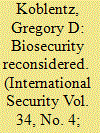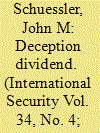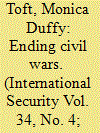|
|
|
Sort Order |
|
|
|
Items / Page
|
|
|
|
|
|
|
| Srl | Item |
| 1 |
ID:
094414


|
|
|
|
|
| Publication |
2010.
|
| Summary/Abstract |
Advances in science and technology, the rise of globalization, the emergence of new diseases, and the changing nature of conflict have increased the risks posed by naturally occurring and man-made biological threats. A growing acceptance of a broader definition of security since the end of the Cold War has facilitated the rise of biosecurity issues on the international security agenda. Developing strategies to counter biological threats is complicated by the lack of agreement on the definition of biosecurity, the diverse range of biological threats, and competing perspectives on the most pressing biological threats. A comprehensive definition of biosecurity that encompasses naturally occurring, accidental, and deliberate disease outbreaks can help to further research, analysis, and policymaking. Operationalizing this broad conception of biosecurity requires a taxonomy of biological threats based on a levels-of-analysis approach that identifies which types of actors are potential sources of biological threats and the groups most at risk from these threats. A biosecurity taxonomy can provide a common framework for the multidisciplinary research and analysis necessary to assess and manage these risks. It also has implications for how to prevent and respond to biological threats, as well as for the future of biosecurity research.
|
|
|
|
|
|
|
|
|
|
|
|
|
|
|
|
| 2 |
ID:
094415


|
|
|
|
|
| Publication |
2010.
|
| Summary/Abstract |
When do leaders resort to deception to sell wars to their publics? Dan Reiter and Allan Stam have advanced a "selection effects" explanation for why democracies win the wars they initiate: leaders, because they must secure public consent first, "select" into those wars they expect to win handily. In some cases, however, the "selection effect" breaks down. In these cases, leaders, for realist reasons, are drawn toward wars where an easy victory is anything but assured. Leaders resort to deception in such cases to preempt what is sure to be a contentious debate over whether the use of force is justified by shifting blame for hostilities onto the adversary. The events surrounding the United States' entry into World War II is useful in assessing the plausibility of this argument. President Franklin Roosevelt welcomed U.S. entry into the war by the fall of 1941 and attempted to manufacture events accordingly. An important implication from this finding is that deception may sometimes be in the national interest.
|
|
|
|
|
|
|
|
|
|
|
|
|
|
|
|
| 3 |
ID:
094411


|
|
|
|
|
| Publication |
2010.
|
| Summary/Abstract |
Since 1990, negotiated settlements have become the preferred means for settling civil wars. Historically, however, these types of settlements have proven largely ineffective: civil wars ended by negotiated settlement are more likely to recur than those ending in victory by one side or the other. A theoretical and statistical analysis of how civil wars end reveals that the type of ending influences the prospects for longer-term outcomes. An examination of all civil war endings since 1940 finds that rebel victories are more likely to secure the peace than are negotiated settlements. A statistical analysis of civil wars from 1940 to 2002 and the case of Uganda illustrate why rebel victories result in more stable outcomes. Expanding scholarly and policy analysis of civil war termination types beyond the current default of negotiated settlement to include victories provides a much larger set of cases and variables to draw upon to enhance understanding of the conditions most likely to support long-term stability, democracy, and prosperity.
|
|
|
|
|
|
|
|
|
|
|
|
|
|
|
|
| 4 |
ID:
094412


|
|
|
|
|
| Publication |
2010.
|
| Summary/Abstract |
Theoretical insights from evolutionary psychology and biology can help academics and policymakers better understand both deep and proximate causes of Islamic suicide terrorism. The life sciences can contribute explanations that probe the influence of the following forces on the phenomenon of Islamic suicide terrorism: high levels of gender differentiation, the prevalence of polygyny, and the obstruction of marriage markets delaying marriage for young adult men in the modern Middle East. The influence of these forces has been left virtually unexplored in the social sciences, despite their presumptive application in this case. Life science explanations should be integrated with more conventional social science explanations, which include international anarchy, U.S. hegemony and presence in the Middle East, and culturally molded discourse sanctioning suicide terrorism in the Islamic context. Such a consilient approach, melding the explanatory power of the social and life sciences, offers greater insight into the causal context of Islamic fundamentalist suicide terrorism, the motivation of suicide terrorists, and effective approaches to subvert this form of terrorism.
|
|
|
|
|
|
|
|
|
|
|
|
|
|
|
|
| 5 |
ID:
094413


|
|
|
|
|
| Publication |
2010.
|
| Summary/Abstract |
The United States needs support from other states to carry out global governance, particularly from rising powers such as China and Russia. Securing cooperation from China and Russia poses special problems, however, because neither state is part of the liberal Western community, ruling out appeals to common values and norms. Nevertheless, an alternative approach that is rooted in appreciation of China's and Russia's heightened status concerns may be viable. Since the end of the Cold War, Chinese and Russian foreign policy has been shaped by the goal of restoring both countries' great power status, which received major blows after China's Tiananmen Square repression and the Soviet Union's breakup and loss of empire. This desire for status can be explained by social identity theory, which argues that social groups strive for a distinctive, positive identity. Social identity theory provides a typology of strategies that states may use to enhance their relative status and suggests appropriate responses to status concerns of rising powers. Redirecting scholarly attention to status considerations and incentives could contribute to a diplomatic strategy for engaging rising powers.
|
|
|
|
|
|
|
|
|
|
|
|
|
|
|
|
|
|
|
|
|